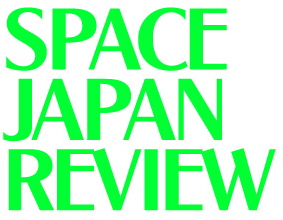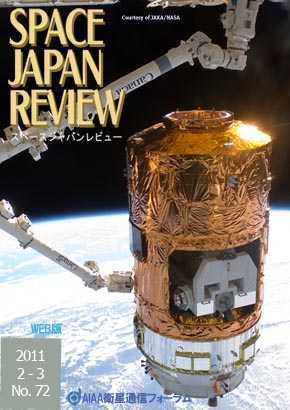
Space Japan Review 2 - 3
No.72 February / March 2011
 KOUNOTORI2 (H-II Transfer Vehicle: HTV2) Courtesy of JAXA/NASA |
Cover Page KOUNOTORI2 (H-II Transfer Vehicle: HTV2) Special Report (in English) International Meetings for Space Agencies Tatsuya Mukai (JAXA) and Susumu Tamaoki (SED) In the world, there are many space agencies and each agency promote their space programs and they work under the frame work where they corporate each other for common programs. e.g., as one of schemes, the space networks which consist of earth and relay stations located on the ground or in space are for the tracking and control of satellites for space exploration and earth observations. To operate satellite systems effectively in these space networks, it is required to coordinate spectrums and data interface in advance. In this review, activities in space agencies are to be introduced and the next review "Discussion on optical communications started in CCSDS" will be continued in the next issue of Space Japan Review. Space Japan Opinion (in English) Reconsidering Future of World Communication Network -The Internet: One Step from Suspicion toward Conviction- Fumio Ikegami [From introducer of this article] This article was presented at "Oslo Meeting" on Nov. 16, 2009, which is the reunion meeting of the Japanese delegates to the 11th CCIR General Assembly held in Oslo, Norway in 1966. The author, Dr. Ikegami, had conducted his research work of radio communications a total for 50 years, namely, at Ministry of Telecommunications and Electrical Communication Laboratory of NTT Public Corporation (28 years), Kyoto University (14 years) and Takushoku University(8 years). Now Dr. Ikegami is Professor Emeritus of Kyoto University and Takushoku University (see Fumio Ikegami: "My Researcher's History", IEICE Communications Society Magazine, No. 6, pp. 4-10, Autumn, 2008 (in Japanese)). About this article, Dr. Ikegami says, "Since the theme of this article is a special problem in the communication technologies, most of people may wonder if this issue is reasonable, while some people may agree with me. Further, I am not a specialist in this field, so I hope that young researchers are interested in this kind of issue on telecommunication network and correct misunderstandings in my argument". A discussion of all of you is expected. (Takashi Iida, JFSC Special Advisor) Space Japan Milestone (in Japanese) HTV2 Berthing Successful to the International Space Station (ISS) Masaaki Shimada, Editor The H-II Transfer Vehicle "KOUNOTORI2" (HTV2) Flight, launched by the H-IIB Launch Vehicle No. 2 (H-IIB F2) on January 22, 2011 from the JAXA Tanegashima Space Center, was successfully berthed to the International Space Station (ISS) on January 28. Report (in Japanese) Discussion on Japan's National Security at JFSC General Meeting Date: June 1, 2010: 14:30-17:00 Chair: Hajime Fukuchi, Tokyo Metropolitan University Speakers: Yasuhiko Yasuda, Takashi Iida and Hiromitsu Wakana Space Japan Book Review (in English) From a satcom researcher point of view Reviewer: Takashi Iida, Editorial Advisor Peter Warren Singer: "Wired For War-The Robotics Revolution and Conflict in the 21st Century", Penguin Press, 2009. Space Japan Interview (in Japanese) Learned from Development of CS "Sakura, Cherry in English", blooming in the universe of "Showa". Akio Iso, NICT Dr. Akio Iso talks about satellite communication services that are expected to play an important role to bridge over digital divides in rural areas. Conference Report (in English) Reports on attending IAC2010 Morio Toyoshima and Ryutaro Suzuki, NICT The 61st International Astronautical Congress (IAC) was held in Prague, Czech Republic between Sep. 27 and Oct. 1, 2010. This paper reports the Conference, featuring the technical symposium on space communications and navigation (SCAN). Conference Report (in English) The IEICE Technical Committee on Satellite Communications Takatoshi Sugiyama NTT Access Network Service Systems Laboratories The technical conference by the IEICE Technical Committee on Satellite Communications was held in 24, 25 February, 2011, with the Space, Aeronautical and Navigational Electronics Committee. They have planned to joint technical conferences in theses years and help both committee members to aggressively communicate each other. Topics from Within (Call for Papers) 29th AIAA International Communications Satellite Systems Conference (ICSSC-2011) The next AIAA ICSSC will be held in Nara City, Japan from 28 November to 1 December, 2011. From Editor This issue (Japanese version) has an approximately fully constitution of Special article, Space Japan Opinion, Education Corner, Space Japan Milestone, Space Japan Book Review, Space Japan Interview, Society news, and World news, thanks to writers' cooperation. Besides, a report of a discussion about national security performed at the AIAA-JFSC general meeting is added as an article. So it has more substantial contents. After this issue was completed, Japan was attacked by unprecedentedly great earthquake and tsunami disaster on March 11, 2011. It is very sad that there more than 25 thousands people are dead or missing. Furthermore, we have an inexperienced situation to be in progress now of a nuclear power plant accident. The information is one of the most important in such a situation. Satellite communications play a role. The SJR editorial committee talks about how the satellite communications is used. It will be reported later because the persons concerned are now struggling the practical work. I would like to ask any comment of readers for an article, while we continue our effort to fill up the English version. I hope you to enjoy SJR also in the future. (TI) |
Editorial Board of Space Japan Review, AIAA JFSC: |
Members of Editorial Board are expecting to have any |
